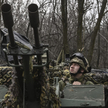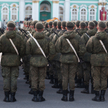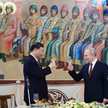read more

Thousands of people came to Ukraine, many of them Americans, with promises of military experience, money or supplies. Local media praised their dedication to their cause, and donors poured millions of dollars into their support.
After more than a year of fighting, the New York Times reports that many volunteers are fighting among themselves and weakening the war effort. Some of them squandered money, while others, preaching dharma, profited from war.
A retired Marine lieutenant colonel from Virginia is the subject of a US federal investigation into the illegal export of military technology. A former soldier turned traitor to Ukraine and fled to Russia. A Connecticut man who lied about his military service posted updates from the battlefield — including his exact location — and boasted of easy access to U.S. weapons. A former construction worker is hatching a plan to use fake passports to smuggle militants from Pakistan and Iran, the New York Times points out, citing Washington’s military support for Americans to have easy access to the Ukrainian military.
read more

Many volunteers who went to Ukraine acted selflessly and heroically. Some of them gave their lives. Foreigners saved civilians, helped the wounded, and fought fiercely alongside Ukrainians. Others raised money for supplies. At the same time, the biggest conflict in Europe since 1945 did not allow us to quickly check who was an experienced soldier and who lacked experience, skills and discipline.
The New York Times reviewed more than 100 pages of documents from the volunteer groups and conducted more than 30 interviews with volunteers, fighters, fundraisers, donors and U.S. and Ukrainian officials.
The interviews revealed a series of frauds, inaccuracies and arguments. One of the most famous Americans on the battlefield was James Vasquez. A local newspaper told the story of a former member of the US Army who left his job and family to go to the front lines with a gun and a backpack.
The American posted recordings of his activities on the Internet and at least once gave the exact location of his group. At the same time, he requested donations from internet users. He argued that he participated in Desert Storm and was in Iraq after 9/11.
read more

A Pentagon spokesman said the report was not true. He specialized in repairs. As he claimed he was in the Army Reserve not as a sergeant, but as a private first class, one of the lowest ranks in the army. Despite this, Vasquez had easy access to weapons, including American guns. Last week, he deactivated his Twitter account when The Times asked him about his actual military experience. He announced he could leave Ukraine because authorities discovered he was fighting without the required military contract.
The International Brigades, set up early in the invasion, spent 10 minutes background checking each volunteer in the early days of the conflict. That’s how Pole joined the group after fleeing the country and being detained in Ukraine for violating gun laws. He became the commander of the unit and soldiers told The Give Independent that he took possession of items, harassed women and threatened his soldiers.
Ukrainian officials initially boasted of 20,000 potential volunteers for the Legion, but far fewer actually enlisted. Currently, there are about 1,500 of them. Some of them are experienced fighters who work as part of Ukraine’s security intelligence.
read more

Legion had problems. Ex-Private John McIntyre, dismissed for misconduct. He fled to Russia and recently appeared on state television, which announced that he had provided intelligence to the Russians.
In their article, the journalists of “NYT” profile Malcolm Nance, a former naval cryptologist and MCNBC commentator, who has come to Ukraine to help with the work of the International Legion. Months later, he became embroiled in internal conflicts among team members, accused of supporting the Russians.
Examples of wasting money are common. Mriya Aid, a group led by a Canadian lieutenant colonel, spent about $100,000. Dollars from donors for technologically advanced night vision devices. They ended up being less successful Chinese models.
Another volunteer group called Ripley’s Heroes reported spending about $63,000. Dollars for night vision goggles and thermal optics. Some of this equipment is subject to US export restrictions because, in the wrong hands, it could give the enemy a battlefield advantage.

. “Hardcore internet junkie. Award-winning bacon ninja. Social media trailblazer. Subtly charming pop culture advocate. Falls down a lot.”
